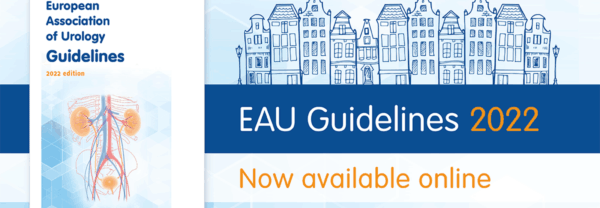An exclusive interview with Prof. Maria Jose Ribal Caparros, new chair of the Guidelines Office
In this exclusive interview, she expounds on what her new role entails, her aims and aspirations, and the pivotal moment she knew she wanted to be a urologist.

Congratulations on your new appointment!
Thank you. It is an immense honour to lead the EAU Guidelines Office (GO). The previous leadership under Prof. James N’Dow was a very fruitful period; the way our EAU Guidelines are conceived underwent a profound transformation. His example will be my motivation. Preserving the excellence achieved in recent years is an important challenge and a great responsibility.
Could tell us about your tasks and responsibilities in this role?
My main responsibilities include leading the GO and ensuring that everything is facilitated to the EAU Panels. These tasks require reaching a consensus on the basis for producing the Guidelines, managing logistical tasks, and promoting the EAU GO and EAU activities.
My role also involves working together with EAU Offices on a regular basis and participating in the EAU organisation since as Guidelines Chair, I am also an EAU Board member. I will also liaise with different societies and organisations involved in the Guidelines production to promote collaborations and joint-venture projects which will:
- Ensure transparency in both production and composition of our Guidelines
- Aid in the integration of the patients’ voice to our Guidelines
- Develop research projects to produce recommendations based on real-world evidence
- Facilitate dialogue among the members of the EAU GO
- Assist the group that the Guidelines represent to maintain and improve their production as the EAU Guidelines are now considered among the best (if not the best) in the field and endorsed by 75 countries
What are your aims and aspirations for the EAU Guidelines Office?
My first objective will be to consolidate and improve the current structure in the elaboration of the Guidelines by developing areas such as prevention in urological diseases, treatment of complications, the inclusion of patient-reported outcomes, and directives for the follow-up of patients.
The second objective is to ensure that patients in Europe receive standardised treatment in order to improve the quality of and the homogenization of care.
As medicine progresses towards a more patient-centred model, it is crucial to maintain the existing initiative and to take the patients’ perspective into account with regard to our Guidelines recommendations. Additionally, we are undergoing a great evolution in data management and the integration of massive data analysis. Therefore, our Guidelines must be pioneers in the incorporation of real-world data and evidence into the structure, methodology, and production of the recommendations.
Looking ahead, we must focus our attention on having our Guidelines as a reference for establishing health policies in urology as well.
You have many urological interests. What fascinates you about these fields?
I feel passionate about my work. I’ve been dedicated to uro-oncology for more than 20 years now, and I couldn’t have chosen a better subspecialty. Major oncology surgery is exciting. I’ve been fortunate to know open surgery, as well as, laparoscopy and robotics which have revolutionized the world of cancer surgery.
I like the operating room a lot and being with patients; talking to them and participating in their stories. In addition, developing an academic career and devoting time to research have been very satisfying. I always liked the process of learning. Cultivating facets beyond your own speciality opens your mind.
How was it like for you as a recipient of the coveted Crystal Matula Award?
For me, the Matula was the award. Not only did I take it as a recognition but also, a welcomed challenge. It has brought me great joy and it has opened many doors. I have it in my office. The award has always been a source of motivation.
When did you know that you wanted to be a urologist
Without a doubt, I always wanted to become a surgeon ever since I was 3 years old! I don’t know why this was so apparent to me because there aren’t any doctors nor surgeons in my family.
In medical school, I was already impressed with urology because of its comprehensive reach. A urologist diagnoses, operates, and follows up. There are research opportunities, too. I am proud of this field and of myself for making the right choice. I’m convinced that urology is the best speciality in the world.
Who or what inspires you, and why?
Inspiration is a complex thing. I admire many, who during my career, have supported me and helped me. I have so many names in mind and I wouldn’t dare to leave any of them forgotten. They know how grateful I am to them because no road is truly travelled alone.
I am inspired by honesty, courage, commitment, enthusiasm, and loyalty. I am inspired by the values that have been instilled in me by my family, as well as, by the love, strength and support of all those who believe in me.


